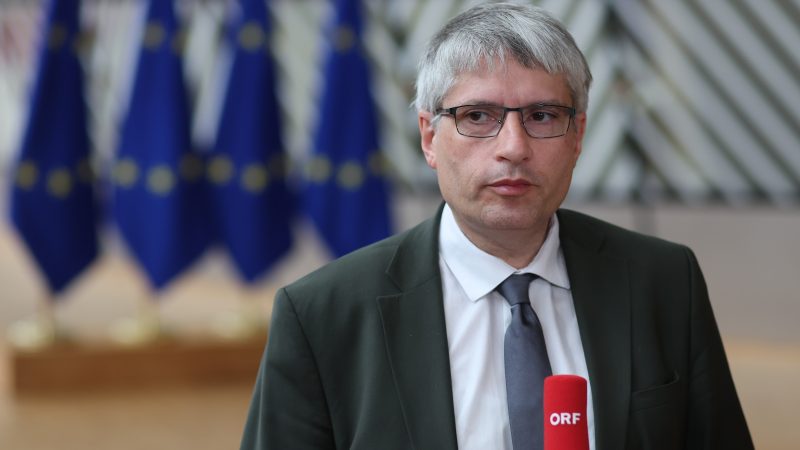Laying out key priorities for the EU’s upcoming Clean Industrial Deal, German Economy State Secretary Sven Giegold said on Monday (30 September) he wants the Commission to prioritise renewable energy, taking a tough line on nuclear power and France’s renewable targets.
Alongside a quicker roll-out of renewable energy facilitated by “further exemptions from [environmental impact] assessments,” Giegold outlined several other German priorities for the EU’s upcoming strategy.
Based on the 2030 renewable energy targets, the EU should also set up a 2040 framework, complemented by new, more ambitious targets for energy efficiency, he said.
“It should include new heating standards, a heat pump action plan and a renovation initiative,” he explained, noting a heat pump action plan was last shelved in 2023.
Hydrogen, made from renewables, should be governed by a “a pragmatic framework,” the German politician stressed, reiterating calls from his boss, Economy Minister Robert Habeck (Greens), to delay strict production rules into the late 2030s.



Pumpspeicherkraftwerke. We have 31 of them in germany. Which is pretty much the maximum possible because you can’t build them just everywhere. And quick search says these things are economically unsustainable because of the extremely high construction costs but very low revenues. It is wasted money.
I wouldn’t go so far as to call it waste. It’s an inherent problem of any energy storage, and we need energy storage if we want to go all in on renewables. Storage has to pay for the energy it stores and can only sell that energy for profit if there is enough demand on the grid, so it sits idle for a lot of time, but you still have the building and maintenance costs.
My wording was poorly chosen. You are right of course. Its not a waste in that sense. But when better alternatives are available, which will hopefully soon achieve an acceptable level of efficiency, it makes no sense to build more. Apart from the space problem.
It’s only wasted money because we deliberately chose to have for profit businesses run infrastructure essential to the functioning of a modern society. In a nationalised power grid, it wouldn’t matter that a storage system has to use electricity in order to store it, because all that matters is meeting the demand and keeping the grid stable. Of course, if all that matters is profits, storage systems will only be economical to a very small subset of operators.
It’s only the maximum possible due to NIMBYs, misguided self proclaimed “environmentalists”, German bureaucrats and their petty shit preventing a dozen or so of new ones from being built in the past two decades. On top of that, idiotic “energy market” rules make them very unlikely to operate at profit, but thanks to the neoliberal ideology, essential infrastructure can’t be state operated.
Feel free to tone it down a little.
Your discussion of reservoirs/pumped hydro seems a bit one-sided too. Environmental concerns around e.g. sawing off hilltops to build a reservoir (happened in Czechia) or of destroying aquatic eco systems by sucking up/shreddering fish along with river water or drying up river beds are pretty real. Not to mention that reservoirs are already massively affected by climate change, as could be seen particularly well in China in recent years.
You know what’s also destroying ecosystems, but at a way larger scale? Climate change.
Landslides caused by reservoirs can be avoided by proper planning.
With your mindset, there won’t be any possibility of transforming power generation to something less environmentally damaging, because everything new you build has to do some sort of environmental damage. Wind turbines will shred some birds, water turbines will shred some fish, you’ll need land to build any of those, you might even have to cut down an odd tree, or two.
Wind turbines shredding birds is almost the definition of concern-trolling whereas the issues with hydro impacting aquatic life are at a much larger scale.
Shit take man, environment is important and having landslides from such a storage is not good. When such a thing breaks it can do serious serious damage to people and nature alike.
NIMBYs are a political reality in a democracy. The power grid has to be built with them in mind. The alternative would be Chinese-style dictatorial measures, which aren’t something you want in a democracy.
NIMBYs aren’t very democratic either, it’s a small, but loud minority holding an entire society hostage.